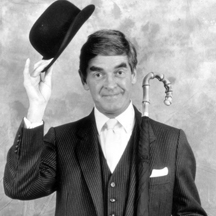
This article was originally published in the summer 2012 issue of CSA Voices.
With all the interest in the film The King’s Speech last year, I was reminded of when I lived in London from 1969 to 1971. I was studying voice, and to support myself I copied music for a publisher. I worked at home and listened to the BBC constantly to keep me company. Struggling as I was with my own stuttering, I was heartened to hear several regular contributors to the BBC who openly stuttered, (usually mildly) – or stammered, as the British call it.
I found England to be a very tolerant country; I felt comfortable there. After all, it had only been 17 years since the beloved King George VI died, and Britons still remembered his struggles with his speech. The outcome of it was that many public figures who may have had a tendency for disfluent speech felt it less necessary to strive to hide their stammering.
One of these men was Lord Carrington, a high-profile conservative British politician, who was often a guest on a public affairs talk show called Any Questions. Four panelists, would discuss current affairs and try to answer political questions put to them by the audience. Lord Carrington often had quite clearly disfluent speech. He would always keep going but there was a constant, “ ... And, and, and then uh, uh I said...” and so on. He was always open about his disfluency.
There was a commentator on TV named Patrick Campbell, who was said to have stuttered quite badly at times. A brief biography on Google says, “Patrick Campbell, who suffered from a serious speech impediment, nevertheless delighted television audiences with his wit, notably as a regular team captain on the long-running Call My Bluff.”

My hero was an actor named Derek Nimmo, who had dealt with a stammer since childhood. He was a regular on a wonderful weekly radio program called Just a Minute, where the contestants had to speak on a given topic for 60 seconds without hesitation, repetition, or deviating from the subject. Points were awarded for successfully completing the 60 seconds. Nimmo was a regular guest on this program and often won. He would put on comic voices or do other tricks to become fluent, but would often have a real block at which point all the buzzers would go off and he would be challenged, usually for repetition or hesitation. Once, I remember, he was accused of repetition and he said, “No. I was saying woo, woo, woo!”
The stage director Jonathan Miller was also a stammerer. He wanted to be a serious actor but was never sure of his speech. He achieved fame at the beginning of his career as one of the members of the comedy revue Beyond the Fringe. This suited him because comedy is improvisational, and he found he could substitute words if necessary during performances. He confessed to all of this on the Merv Griffin Show in 1982.
These are only a few of the people who stuttered I heard as a young man, and they gave me hope and inspiration. We must always remember that stuttering is something we do some of the time – it is not who we are. These men were not afraid to speak and stutter in public, and did not choose to become obsessed with hiding it or to retreat into silence.
Winston Purdy lives in Montreal and is on the CSA Board of Directors.